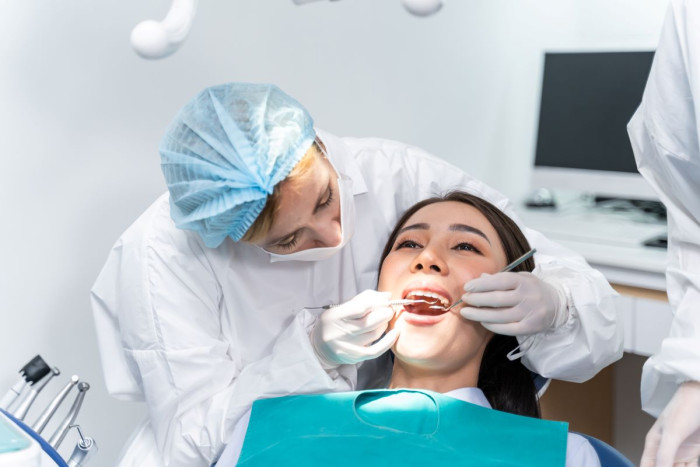Dentist
Ngaio Niho
Alternative titles for this job
Dentists study and treat diseases, injuries and problems of the mouth, teeth, gums and jaw. They also educate patients on how to avoid oral health problems.
Pay
Dentists can earn
$129K-$254K per year
Source: ASMS and NZDF, 2023.
Job opportunities
Pay
Pay for dentists varies depending where they work, their experience, location and size of their practice.
Dentists who work for Te Whatu Ora Health NZ (previous DHBs)
- Dental officers earn between $129,600 and $195,800 a year.
- Dental specialists or principal dental officers can earn between $170,000 and $251,000.
Dentists who work for the New Zealand Defence Force
- Dentists can earn from $196,000 to $254,000.
Dentists in private practice may earn more than this, but their income depends on the success of their business. They may be paid a salary or be on commission related to how many patients they treat.
Sources: careers.govt.nz research; New Zealand Defence Force website, accessed October 2023; and Association of Salaried Medical Specialists, 'New Zealand District Health Boards – Senior Medical and Dental Officers Collective Agreement, 1 April 2022 - 31 March 2023'.
- Defence Careers website - Dental Officer (Dentist)
- Te Whatu Ora website - Senior Medical and Dental Officers Collective Agreement 1 April 2022- 31 March 2023 (PDF - 704KB)
- PAYE.net.nz website – use this calculator to convert pay and salary information
(This information is a guide only. Find out more about the sources of our pay information)
What you will do
Dentists may do some or all of the following:
- examine patients' mouth, teeth, gums and jaw
- identify and treat diseased teeth and gums
- replace missing teeth with implants, bridges, or partial or full dentures
- improve the appearance of teeth with veneers, crowns, bleaching or braces
- advise patients on how to keep their teeth clean and prevent diseases
- refer patients to other dental specialists and health professionals
- dental research.
Skills and knowledge
Dentists need to have knowledge of:
- how to assess and identify dental problems
- the structure and functions of the teeth, jaw and mouth
- the structure and functions of the body, and general injuries and diseases of the body, especially the head and neck
- injuries and diseases of the mouth
- dental and oral health care methods, materials and medicines
- hygiene and sterilisation procedures
- first aid.
Working conditions
Dentists:
- usually work regular business hours, but may be required to do some evening and weekend work
- work in offices and surgeries in places such as private practices, hospitals and community health centres.
What's the job really like?

Laura Ichim
Dentist
How did you get into dentistry?
“I kind of fell into it. When I was in my final year of secondary school I got a summer holiday job working at my dentist’s practice as a receptionist and dental assistant, and I loved it. Before that I thought I was going to be a doctor but that experience opened my eyes to dentistry.”
What do you enjoy and find most challenging about being a dentist?
“We’re busy, we get to meet lots of cool people from all walks of life and for me personally it’s the human interaction that I really enjoy.”
“There are lots of challenges. It’s hard seeing people in pain but the flipside is that we’re able to help people, which is quite a privilege.”
What advice would you give someone interested in a career in dentistry?
“Go and check it out and see what it actually involves. Definitely read about it, but go and talk to your local dentist as well to find out if you would be interested.
“It’s also worth starting to plan towards becoming a dentist early on because the first year of university is quite tricky and you’re expected to know a lot of science. So if you’re thinking of going down a health sciences career path it’s worth doing some science subjects at school if you can.”
Entry requirements
To become a dentist you need to:
- complete the Health Sciences First Year programme at Otago University
- complete a four-year Bachelor of Dental Surgery degree at Otago University.
The University of Otago is the only university in New Zealand that offers a Bachelor of Dental Surgery.
- University of Otago website - Health Sciences First Year Programme
- University of Otago website - Bachelor of Dental Surgery
The Vulnerable Children Act 2014 means that if you have certain serious convictions, you can’t be employed in a role where you are responsible for, or work alone with, children.
Secondary education
A tertiary entrance qualification is required to enter further training. Useful subjects include maths, chemistry, physics, biology, health education and English.
Additional requirements for specialist roles:
To specialise in an area of dentistry, such as orthodontics, you need to complete postgraduate study at the University of Otago. You also need to be registered as a dental specialist with the Dental Council of New Zealand.
Personal requirements
Dentists need to be:
- able to relate to a wide range of people
- accurate, with an eye for detail
- able to work well under pressure
- good at problem solving and decision making.
People skills are crucial. It’s also important to be able to imagine walking in your patient’s shoes and understand how they’re feeling and why they’re feeling that way.

Laura Ichim
Dentist
Useful experience
Useful experience for dentists includes work with people, particularly in the health industry.
Physical requirements
Dentists need to have good eyesight (with or without corrective lenses) and good hand-eye co-ordination.
Registration
Dentists need to be registered with the Dental Council of New Zealand.
Find out more about training
- University of Otago - Faculty of Dentistry
- (03) 479 7019 - dentistry@otago.ac.nz - www.otago.ac.nz
What are the chances of getting a job?
Securing full-time work can take longer for newly-qualified dentists
Newly-qualified dentists may find it difficult to find work, because there is strong competition for vacancies and not all dental practices can provide the necessary support graduates need.
It may take up to a year for dentistry graduates to find full-time work, and initially they may work part time or at multiple dental practices.
According to the Census, 2,055 dentists and dental specialists worked in New Zealand in 2018.
Chances of finding work better in regions and for skilled dentists
Chances of finding work as a dentist are better outside the main centres as competition for roles is higher in Auckland, Wellington and Christchurch. There is also high competition for hospital dentistry roles.
Dentist appears on Immigration New Zealand's Green List. This means the Government is actively encouraging skilled dentists from overseas to work in New Zealand.
Most dentists work in private dental practices
Most dentists are self-employed in a dental practice, but some are employees. Others are employed by:
- hospitals
- community dental services
- the New Zealand Defence Force
- the Faculty of Dentistry at the University of Otago.
Sources
- Dental Council of New Zealand, 'Workforce Analysis 2013-2015', July 2017.
- Immigration New Zealand, Green List, April 2023, (www.immigration.govt.nz).
- Meffan, A, dentist, careers.govt.nz interview, October 2018.
- New Zealand Dental Association, careers.govt.nz interview, November 2018.
- Stats NZ, '2018 Census Data', 2019.
(This information is a guide only. Find out more about the sources of our job opportunities information)
Progression and specialisations
Dentists may progress to set up their own practice.
Dentists may specialise in an area of dentistry such as:
- Oral and Maxillofacial Surgeon
- Oral and maxillofacial surgeons diagnose diseases, injuries, and defects of the jaw and surrounding structures. They also perform surgery to correct these diseases, injuries or defects.
- Oral Medicine Specialist
- Oral medicine specialists diagnose and manage the oral health care of patients with medically related disorders of the teeth and jaw.
- Orthodontist
- Orthodontists diagnose and correct bad bite, crooked teeth and poor jaw growth in children and young people. This often involves fitting braces and can involve correcting facial abnormalities such as a cleft palate.
- Paediatric Dentist
- Paediatric dentists provide oral health care to children from birth through to adolescence. Their work involves the management of dental problems related to behavioural, physical or developmental disabilities.
- Periodontist
- Periodontists treat diseases of the gum to prevent tooth loss.
Last updated 9 October 2023


